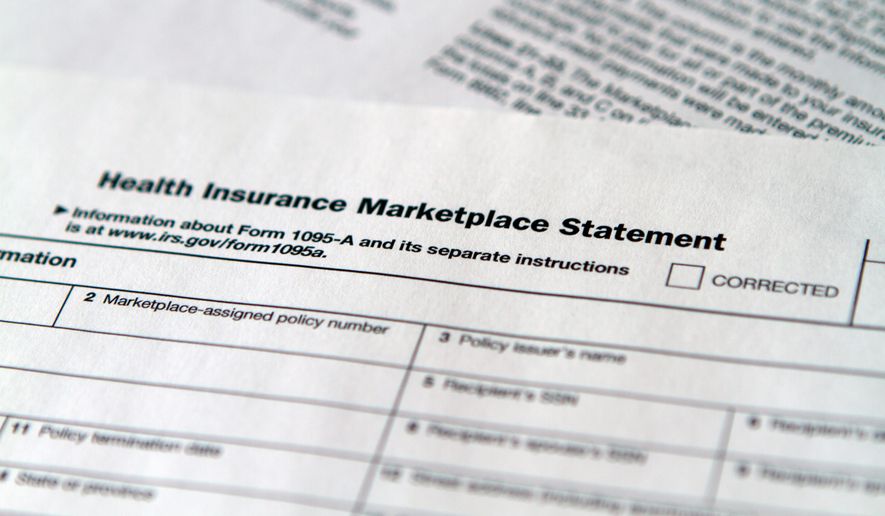Taxpayers are already telling their accountants they plan to stiff the IRS on the Obamacare tax, saying they figure the chances the agency comes after them for a few hundred bucks are pretty slim, and it makes sense to take the risk.
Still other taxpayers are recoiling when they find out they owe far more than the $95 minimum penalty for not having insurance in 2014, said Christopher Wittich, an accountant in Minnesota.
“And that’s a big problem for them,” he said. “They don’t have 200 bucks.”
Taxpayers are facing the first round of penalties under Obamacare’s “individual mandate,” which requires most Americans to prove they have health insurance coverage or else pay the tax that the Supreme Court ruled made the law constitutional.
But Indiana accountant Scott Frick said one of his clients, told he would have to fork over $850 for going without insurance last year, thought about the IRS and decided not to pay, just to “see what happens.”
The episodes raise questions for the revenue agency, which is trying to figure out just how far it’s prepared to go to collect the Obamacare tax — and if future administrations will enforce it at all.
Under the 2010 law the IRS cannot pursue criminal penalties or put liens on the property of people who ignore the Affordable Care Act’s mandate.
“All the IRS can do to get the money is ask an individual to pay it, and, if they don’t, reduce their future refunds,” said Brendan Buck, spokesman for House Committee on Ways and Means Chairman Paul Ryan, Wisconsin Republican, who oversees tax policy.
IRS officials pointed to a similar explanation on its website, which says it can’t issue liens or levies, but “if you owe a shared responsibility payment, the IRS may offset that liability against any tax refund that may be due to you.”
The Obama administration has estimated that up to 6 million people will have to pay the penalty this tax season, although it’s letting penalty payers in 37 states served by HealthCare.gov avoid a hefty 2015 penalty by signing up between March 15 and April 30 if they missed the Feb. 15 deadline.
Republicans say the administration is overstepping its powers by offering the extra grace period, and the House has filed a lawsuit against Mr. Obama for postponing part of the Affordable Care Act’s employer mandate.
The administration says the delays are within its prosecutorial discretion, which it’s also cited to allow people to keep insurance plans that do not comply with the health law’s coverage requirements.
It’s the same power the administration has claimed in Mr. Obama’s new immigration policies, which offer a deportation amnesty, work permits and Social Security numbers to millions of illegal immigrants. A federal judge has ruled the amnesty is likely illegal, and has issued an injunction halting it for now.
Sen. John Barrasso, Wyoming Republican, said the president’s repeated use of prosecutorial discretion is setting a poor precedent for either party.
“If President Obama continues to try to act in ways that I believe are illegal, what’s to stop a Republican president to not just say we’re going to go after other sorts of things like the health care law,” he said in a brief interview. “So that’s why I think it’s so important that President Obama be limited in the things he’s trying to do right now.”
Darrell M. West, director of governance studies at the Brookings Institution, said the executive branch has “considerable leeway” in how it implements Obamacare, so a future Republican administration could use its own discretion to be more lax about enforcing the mandate.
“We certainly would expect a Republican president to do all he could to undermine and reverse the ACA,” he said in an email. “All the GOP candidates are on board with that strategy. And if there is a Republican president, there is likely to be a GOP House and Senate as well, so there will be few institutional barriers to these kinds of actions.”
For now nonexempt filers who flouted the mandate last year must pay the greater of $95 or 1 percent of their household income above the filing threshold, a penalty that rises to $325 or 2 percent of income in 2015.
A new study by H&R Block says tax filers have generally been truthful about their health care status, and that the average tax penalty so far is $172. That may catch some filers off guard, since the $95 penalty had been imprinted in the public psyche.
“I think people didn’t understand how [their penalty] was calculated, and they still don’t,” said Mr. Wittich, who works at a practice in Bloomington, Minnesota, and volunteers at a tax clinic.
Others understand what’s at stake but choose to ignore it.
Mr. Frick, in Kendallville, Indiana, said the client who balked at the $850 payment removed the line from his taxes on his own.
“He’s kind of a rebel,” the accountant said.
The mandate is the most contentious aspect of Mr. Obama’s signature law and served as the focal point for the Supreme Court decision that upheld the 2010 law as constitutional.
Obamacare’s framers included the requirement to make sure enough young, healthy people purchased insurance on the new health exchanges, keeping premiums in check when people with pre-existing medical conditions, who no longer can be denied coverage, enrolled.
Filers will not be penalized unless they go without health insurance for more than three straight months.
Several exemptions from the mandate were built into the health care law, covering everyone from illegal immigrants and prisoners to those who have religious conscience objections, such as the Amish, and health care sharing ministries members, who take care of each other’s health care costs through direct payments.
The Department of Health and Human Services also extended 14 exemptions to people who experience a hardship that could prevent them from complying with the mandate.
• Tom Howell Jr. can be reached at thowell@washingtontimes.com.




Please read our comment policy before commenting.